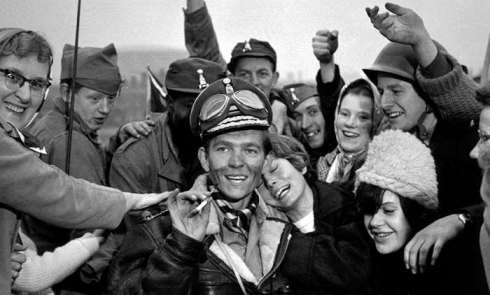
 Tom Courtenay plays a young man who loses himself in grandiose fantasies in order to escape his dull life, in this sharply observant film from 1963.
Tom Courtenay plays a young man who loses himself in grandiose fantasies in order to escape his dull life, in this sharply observant film from 1963.
Overshadowed by the French New Wave of the late 50s and early 60s, England had its own cinematic revival during the same period. A group of young directors challenged old assumptions about what a film should be. One marvelous example is the 1963 film Billy Liar, directed by John Schlesinger.
Tom Courtenay plays Billy Fisher, a young man who still lives with his parents, and works as a clerk for an undertaker in a dreary Yorkshire town. But where he really lives is in a fantasy world—a mythical country called Ambrosia, where he is king, dictator, general, political prisoner, famous novelist, and any number of other beloved figures. As he whiles away his time in imaginary heroics, he fends off reality by weaving an elaborate web of lies, most of them designed to make him seem more important to others, but his implausible stories only create more and more chaos in his life.
Schlesinger mines this comic tale, written by Keith Waterhouse and Willis Hall, for all it’s worth. The film’s sharp vision of small town pettiness is interspersed with brilliant and hilarious fantasy sequences. (The imaginary parade scene that opens the film, for instance, features a squadron of wounded soldiers who can only salute with their left arms, since they all happen to have lost their right ones in battle.) Courtenay is excellent in the title role—outlandishly funny, but with a sad, lost quality that makes you care about him.
Most of the film tracks the audacious progress of Billy’s stories, particularly his engagement to two different girls—borrowing the ring from one on the pretext of fixing it at the jeweler, and then giving it to the other. But there is one note of hope beckoning to him: the free-spirited Liz, played by Julie Christie in her first major role. She understands Billy and his need to escape, because she’s done it herself, traveling about the country and doing as she likes. Christie invests her few scenes with an enchanting energy. She adds a touch of spontaneity to the film’s somewhat over-determined structure.
Crisply shot in black and white by Denys Coop, with dead-on performances from the supporting players, Billy Liar feels small, like a chamber piece as opposed to a symphony. But it’s one of those comedies that ends up meaning a lot more than you expect it to. Fantasy, it seems, is not only a defiance of the dreary, oppressive world that hems Billy in; it also represents the fear of making a real break with it. This double meaning meets in the hidden recesses of his tragicomic anguish. When we’re brought up to never believe in ourselves, we can end up trying to lie our way into love.
Billy Liar is available on DVD.

